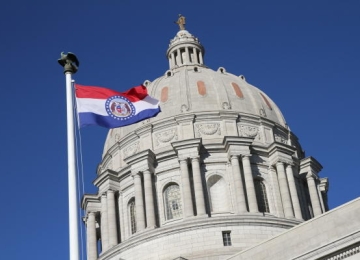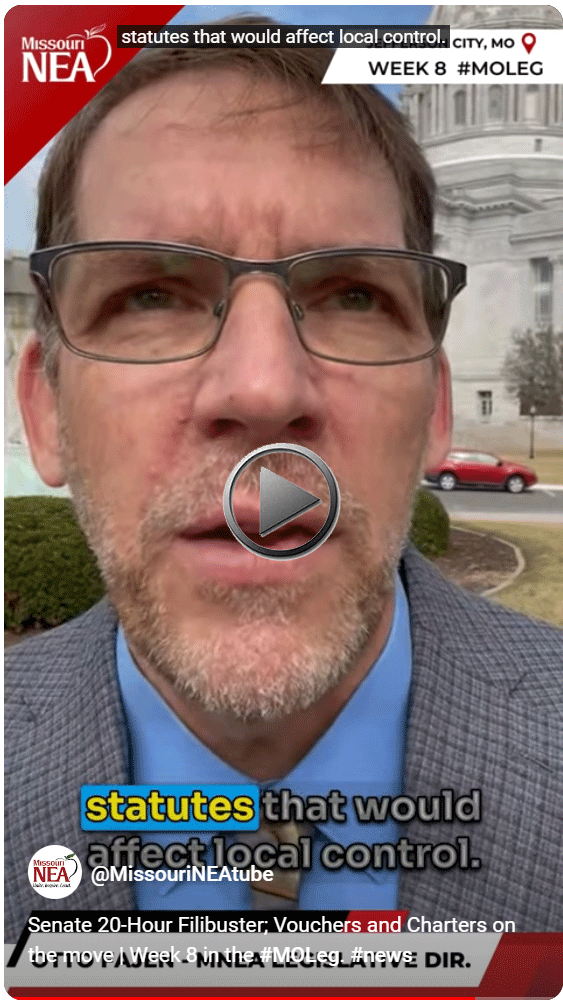CAPITOL ACTION DAYS
Capitol Action Days are part of the Association's plan to promote positive policy for public education. MNEA's Capitol Action Days continued on February 21 with members visiting the Capitol and meeting with legislators. For more information and to register for your Capitol Action Day, please visit https://www.mnea.org/CAD
The Senate gave final approval (Third Reading vote) to Senate Substitute #4/SJR 74 (Mary Elizabeth Coleman) on February 22 by a party-line vote of 22-9. The Association opposes the joint resolution and remains concerned that the resolution will make it more difficult for Missouri citizens to bring forward and gain approval on measures of interest brought by the initiative petition process.
When debate began this week, Senate Democrats made clear their intention to stand up and block any version of the resolution with so-called "ballot candy." Ballot candy is a name given to bogus provisions added to trick voters into voting for the measure, such as including broadly supported policies that are already law. The Association appreciates the steadfast efforts of those Senators who opposed the measure and went to great lengths to protect the rights of Missouri voters from a measure with deceptive "ballot candy."
After 20 hours of filibustering, the Senate approved an amendment offered by Sen. Mike Cierpiot to strip out all the ballot candy from SJR 74. This change leaves only a heightened approval threshold for constitutional changes proposed by initiative or convention. SJR 74 raises the approval requirement for those constitutional amendments to add a concurrent majority in a least a majority of Missouri's Congressional districts. The measure would leave a questionable mismatch for measures submitted by the legislature, as these proposals would become effective with just the current simple majority requirement.
The House gave final approval to HCS/HB 1749 (Mike Haffner) on February 22 by a vote of 104-41. The bill enacts numerous provisions regulating the initiative petition process. The Association opposes the bill. Some of the measures are likely to lengthen the time it takes to get an initiative petition approved and thus make it harder to get an initiative on the ballot. Several of the restrictions on signature gathering in this bill have already been ruled unconstitutional in other jurisdictions. The bill would also allow partisan statewide officers to become arbiters of the policies that may be brought forward by initiative petitions. The Association is concerned that these factors will undermine the ability of citizens to bring forward issues by the initiative.
SENATE SELECT COMMITTEE ON EMPOWERING MISSOURI PARENTS AND CHILDREN
The committee voted to approve many previously heard bills on February 21. Once reported to the floor and placed on the calendar, these bills could be taken up for debate in the coming weeks:
VOUCHER EXPANSION AND CHARTER EXPANSION: SCS/SB 1391 (Tony Luetkemeyer) and SB 1392 (Curtis Trent) both contain provisions expanding the existing tax credit voucher enacted in 2021 and authorizing the establishment of charter schools in St. Louis County, St. Charles County, Columbia school district without sponsorship by the local school board. The Association opposes both bills.
OPEN ENROLLMENT: SB 1051 (Curtis Trent) creates a public school open enrollment plan. The Missouri NEA believes that public school choice plans with state funding may harm students and our public schools unless essential criteria are in place for implementing, monitoring, and evaluating their effectiveness. SB 1051 shares provisions in common with HB 1989 (Brad Pollitt). Unlike HB 1989, SB 1051 allows non-resident pupils to transfer to charter schools as well as to other school districts. The bill also lacks a number of other essential criteria contained in HB 1989. The Association opposes SB 1051.
TEST, BLAME AND PUNISH: SCS/SB 1366 (Curtis Trent) specifies a detailed methodology for calculating school building performance scores based primarily on student scores on standardized tests. The bill does not provide any structure to provide support to help schools improve. The bill hearkens back to the now-abandoned "test, blame and punish" mindset of the former, federal NCLB Act. The Association opposes the bill.
SPECIAL EDUCATION: SB 812 (Mary Elizabeth Coleman) requires parental consent for changes to individualized education programs (IEPs).
CARDIAC RESPONSE PLANS: SCS/SB 1032 (Karla Eslinger) is similar to SB 1081 (Lauren Arthur) and requires public schools to develop and implement a cardiac emergency response plan. The bill requires coordination with emergency service providers, include guidelines for the plans, and requires relevant training for appropriate personnel. The Missouri NEA believes that all schools must have written plans that delineate procedures regarding emergencies. The Association also believes that education employees should have the opportunity for training in CPR and the proper use of defibrillator, Naloxone, and epinephrine dispensers by qualified personnel. The Association supports the bill.
VIRTUAL SCHOOLS: SB 1375 (Karla Eslinger) makes minor revisions to clarify the new structure of accountability, enrollment, participation, and finance created enacted for full-time virtual schools in 2022 by SS/HCS/HB 1552 (Richey). The Association supports the bill.
HOUSE ELEMENTARY AND SECONDARY EDUCATION COMMITTEE
The committee voted to approve three measures on February 21:
SCR 23 (Nick Schroer) disapproves and suspends the final order of rulemaking for a rule proposed by DESE relating to the Virtual Instruction Program. Several provisions in the rule were inconsistent with the provisions enacted for full-time virtual schools in 2022. The SCR must be approved by both chambers within the first thirty legislative days of session (by the end of the month) to permanently suspend the rule.
HB 1513 (Jim Murphy) pertains to media literacy and critical thinking. The bill requires DESE to create a pilot program on the topic involving five to seven public schools around the state and to submit a report on the program to the legislature by January 1, 2028.
HCS/HB 1431 (Willard Haley) raises the minimum teacher salary in Missouri from $25,000 to $38,000. The HCS contains the same provisions regarding teacher minimum salaries that the committee approved last week in HCS/HB 1447 (Ed Lewis), but HB 1431 does not contain any of the other provisions addressed in HB 1447. HCS/HB 1431 also raises the minimum salary for teachers with ten years of experience and a master's degree to $46,000 for the 2027-28 school year. The HCS provides an annual inflationary increase for both salary levels up to a maximum of three percent per year and beginning in the 2028-29 school year. The HCS also creates an ongoing grant fund that could provide state funding to support the salary increases.
The Association believes that salary schedules should provide for entry-level salaries and career earnings comparable to those of other professions and occupations with similar preparation and responsibilities. Increasing minimum salaries is a positive step in meeting this standard. Maintaining improved salaries will require adequate and sustainable funding for all school systems.
CARDIAC RESPONSE PLANS
The House Committee on Crime Prevention and Public Safety heard HB 1991 (Sherri Gallick) on February 22. The bill requires public schools to develop and implement a cardiac emergency response plan. The bill requires coordination with emergency service providers, include guidelines for the plans, and requires relevant training for appropriate personnel. The Missouri NEA believes that all schools must have written plans that delineate procedures regarding emergencies. The Association also believes that education employees should have the opportunity for training in CPR and the proper use of defibrillator, Naloxone, and epinephrine dispensers by qualified personnel. The Association supports the bill.
STEM CAREER AWARENESS
The House Special Committee on Education Reform met on February 19 to hear HB 1972 (Alex Riley) to establish the STEM Career Awareness Activity Program.
PUPIL TRANSPORTATION
The House Elementary and Secondary Education Committee met on February 21 to hear HB 2423 (Kurtis Gregory) regarding background checks and pupil transportation. The bill extends existing background check requirements for school districts to also apply to charter schools. The bill also extends background check requirements for school bus drivers to drivers of other vehicles used for transporting pupils. The bill also changes the definition of "school bus" to apply to vehicles designed to carry more than 15 passengers.
SENATE SELECT COMMITTEE ON EMPOWERING MISSOURI PARENTS AND CHILDREN
In addition to the executive session on previous bills, the committee met on February 21 to hear three bills:
SB 749 (Lincoln Hough) to remove degree granting restrictions for research doctorate degrees and certain professional and medical degrees.
SB 784 (Doug Beck) to revise school terms and calendars. The bill requires districts in charter counties and cities over 30,000 population to have at least 169 school days unless voters approve a four-day school week. Districts with a five-day school week will annually receive an additional payment of 2% of the prior year state aid to be used solely to increase teacher salaries. Districts with a school term of at least 175 school days may establish a school starting date prior to 14 days before Labor Day.
SB 907 (Jill Carter) to add health and life sciences and immersive learning experiences to the mission of Missouri Southern State University.



